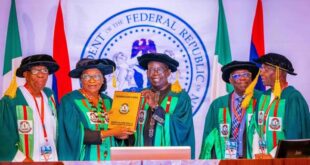THE African Agricultural Technology Foundation, AATF, weekend, explained why former President Goodluck Jonathan was appointed ‘Africa Ambassador for Agricultural Technology’, which was based on the indelible agricultural initiatives he reeled out to take Nigeria’s agricultural sector to an enviable height with various policies, programmes and projects.
Speaking in an interactive session with agric correspondents in Abuja, the Executive Director, Dr Canisius Kanangire, made this known, and said there is still a lot to do for biotechnology to be embraced in the continent.
Kanangire said Jonathan has all it takes to motivate other African countries to embrace agricultural technologies that would change the narrative.
He said: “His Excellency, Goodluck Jonathan, one of the areas where he brought innovative ideas was agriculture, with his Agricultural Transformation Initiative of Nigeria, and he made success.
“And today when I look at how Dr. Akinwumi Adesina talks and knowing that he was his Minister of Agriculture, I cannot help it but I feel proud of that initiative, and that is why when we are selecting people to help us do something, among the names that I put on the list and started discussing with some of the board members, was the name of Jonathan Goodluck.
“So what we expect of him is that he (Jonathan) brings this voice of ours, we and yours to the highest level where our limit does not allow us to reach he can open the door of his peer, current Presidents of different countries in Africa, and tell them ‘I believe this is the way we can change our nations on the African continent’.
He can talk to our various ministers; ‘You are doing policies but I tried this and I know if it can work if you don’t do this I don’t know if you will reach the result that you expect’.
So he will talk as a high level ambassador who will talk as one who has tried his ammunition on transforming one of the biggest countries on the continent. He will talk as one who is also a scientist in this area.
“We believe that his interventions will bring our voice very high and convince many of the changes that we need and it will be an opportunity also to scale up his initiatives on the Nigeria to the whole continent, and contribute to the agricultural transformation initiative of Sub Saharan Africa, in particular, and the whole of Africa in general.”
Meanwhile, the AATF boss said biotechnology is making appreciable progress in Africa as African countries are keying into it.
“Biotechnology is one of the key areas of those technological changes that we need to bring to Africa, and it comes within a number of processes, and we need to identify the needs on the African continent from the farmers’ level and discuss it with the country where we are, which is the government authorities.
“We need to go out and scout the right technologies that we need, negotiate it so that it can be transferred to our governance, and that I would say is the niche of AATF, and we have been doing quite properly.
Another thing is to have policies that will enable us to bring that biotechnology product to the consumers in the country and the first element has been to work with different countries, including Nigeria to improving and putting in place, the National Biosafety Laws and having the right institutions to really lead the regulatory framework on biosafety that has been done in a number of countries, not only Nigeria, and we are progressing quite well on that.
“I would say quite well, but we would like to have it more expedited, but countries have the sovereign of being first convinced of what they are doing and I am happy with that.
“The second thing now is that we will bring the product to the country and in Nigeria, we have been successful in bringing Pod Borer Resistant (PBR) cowpea, which resists the Maruca vitrata, and it changed quite a lot in terms of productivity, and reduced a lot the number of sprays of insecticides that were applied by the farmers.
“I would say from eight or more sprays to maximum two. I think that is a real game changer economically, environmentally and health wise. With the PBR cowpea productivity is increasing and Nigeria has also released the uptake and utilisation of Tela Maize.
“Tela Maize is also insect resistant maize, which resists stem borer that is also in progress, and from the example that we achieved here, Ghana is progressing, they have already released the PBR cowpea, we are expecting quite soon to have it in the hands of the farmers.
“And we hope that Burkina Faso will come on Tela Maize. Also, biotechnology products are already planted. In South Africa, but soon we will have it in Ethiopia, in Nigeria, in Kenya and in Mozambique.
“So progress is coming up quite well on biotechnology and GMOs, and there are also projects on geno editing which are in the pipeline. So, biotechnology is coming quite well and we are learning and getting encouraged by the successes.”
However, he (Kanangire) pointed out that seed production remains a central component of shielding farmers and the value chain against the insects.
Meanwhile, he acknowledged that Nigeria is leading other African countries in policy advocacy, communication, scientific research and adapting the technology to meet the need, and added that Nigeria has been “a real big brother” on the African continent producing very good things to emulate.
“One of the key areas is the seed production, the putting in place of seed systems, that is very critical because it is good that we the scientists and other technocrats and media people work together to bring the good message to the people and then say we need productivity. We need to be shielded against these insects, and then give us the seed and we don’t have seed that is something which can kill the organism.
“And that is why we need to work very shortly to put in place a very high quality and very effective and efficient seed system. That is what we are working on with all our partners in Nigeria, including all these authorities and the IAR that is spearheading the adoption of this technology”, he stated.
He also pointed out that the mechanisation actually is one area where Africa is not doing well, and added that AATF is keen about it, “So now, We absolutely need to mechanise.
“Mechanisation is critical to achieving food security, and prosperity through agriculture. We are encouraging it in different ways at AATF, a decade ago, and we piloted what was called the Cassava Mechanisation and Agro-processing Project, CAMAP, which was active in Nigeria, Zambia, Uganda, and Tanzania.
“Here in Nigeria, we have continued that same initiative that we started with CAMAP, we have what we call Agridrive, and it is a company which provides mechanisation services to farmers, including the smallholder farmers, who cannot buy their own tractors. And this is also to show that actually we can change the lives of many by having this type of service”
 The Commerce Africa African Reneissance
The Commerce Africa African Reneissance




